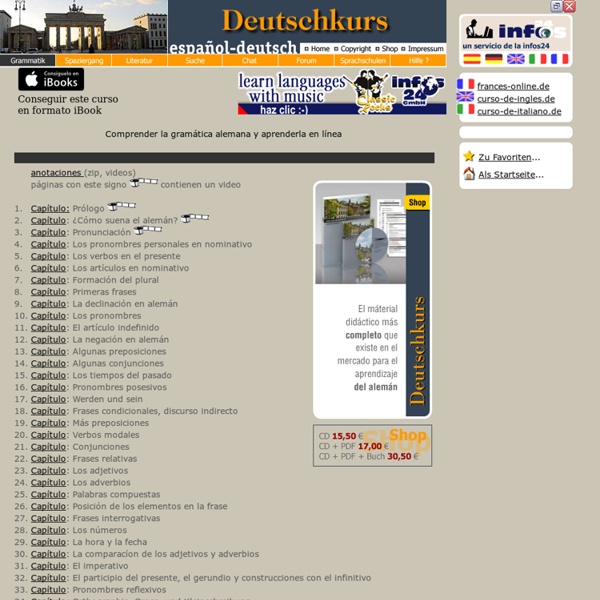



Alemán Autodidacta - Cursos de alemán Aquí encontraras el curso de alemán que estabas buscando para empezar con tu estudio o para mejorar tu nivel en el idioma Curso de alemán online Deutsch Interaktiv Una excelente idea para acompañar nuestro aprendizaje es un curso interactivo de alemán, como complemento a cualquier recurso que podemos obtener de la web, tales como gramática, vocabulario, verbos, ejercicios, lecciones, etc. La Deutsche Welle nos ofrece un excelente curso de alemán online completamente interactivo, que abarca los niveles básico e intermedio del idioma. Curso radiofónico de alemán Deutsch - warum nicht? Queremos dejar a disposición de nuestros lectores el enlace a un curso radiofónico de alemán producido por la Deutsche Welle, en cooperación con el instituto Goethe. El curso trata la historia de un joven veinteañero, trabajando en un hotel en la ciudad alemana de Aquisgrán (en alemán „Aachen“), acompañado de una simpática señorita llamada Ex. Curso de alemán avanzado Wieso nicht? Aprender alemán fácilmente
Nancy Thuleen Aprender alemán online gratis | Aleman Autodidacta Ejercicio para aprender las terminaciones de los adjetivos | Aleman Autodidacta Para poder llevar a la práctica este ejercicio, se requieren algunos conocimientos previos de los adjetivos del idioma alemán, que vamos a explicar a continuación. Dejamos afuera el caso genitivo del idioma, para quitarle un poco de complejidad al asunto. Las terminaciones de los adjetivos son regulares respecto del género del sustantivo (masculino, femenino, neutro o un sustantivo en plural) y el caso del idioma utilizado (en nuestro caso: nominativo, acusativo o dativo). Primero veamos qué pasa con las terminaciones del adjetivo cuando el sustantivo está acompañado por un artículo, que puede ser un artículo definido (bestimmter Artikel) o un artículo indefinido (unbestimmter Artikel). La primera tabla expone las terminaciones de los adjetivos luego de un artículo definido. La segunda tabla expone las terminaciones de los adjetivos luego de un artículo indefinido. Por ejemplo, el primer sustantivo de la presentación es „Tee”; que adjetivos pueden acompañar a este sustantivo?
El Alemán es fácil | Aprende alemán desde la ignorancia, es gratis y online. German Grammar - Cheat Sheet Declension of Definite Article Declension of Indefinite Article Declension of Adjectives with Definite Article Applies to: alle (plural), derjenige, derselbe, dieser, jeder (singular), jener, mancher (singular), solcher, welcher Declension of Adjectives with Indefinite Article Applies to: ein, kein, possessive adjectives Declension of Bare Adjectives (without Article) Applies to: einiger, mehr, wenig, viel Declension of Adjectives with Masculine Nouns Declension of Adjectives with Neuter Nouns Declension of Adjectives with Feminine Nouns Declension of Adjectives with Plural Nouns Declension of Demonstrative Adjectives Declension of Indefinite Adjectives Declension of Possessive Adjectives Personal Pronouns There are also reflexive pronouns for the dative case and the accusative case but they only become visible in the 3rd person where the reflexive pronoun for both plural and singular is "sich". Relative Pronouns Declension of Interrogatives Prepositions Akk a direction or destination: wohin, worüber Sein
El verbo denken en Alemán Cita: Ich denke, also bin ich Pienso luego existo René Descartes (1596-1650) Significado de denken El verbo denken significa: 1. Das gibt mir zu denkenEsto me hace que pensar 2.- denken + an + (Acusativo) ➜ pensar en Ich denke an dichYo pienso en ti Ich denke daranYo pienso en ello Woran hast du gedacht? 2.- denken + über + (Acusativo) ➜ pensar sobre Ich denke gerade über mein Leben nachYo estoy pensando sobre mi vida 3.- sich denken ➜ pensarse (verbo reflexivo) Pronunciación: [ˈdɛŋkn] (ver pronunciación en alemán) Gramática de denken denken es un verbo irregular Conjugación de denken Presente Indicativo (Präsens Indikativ) Perfecto (Perfekt) Pretérito (Präteritum) Conjuntivo II (Konjunktiv II ) Participio (Partizip) Imperativo (Imperativ) Verbos con la raíz 'denken' Temas relacionados:Conjugación verbal
Learning German Online for Beginners Learn German - online, simple, independently and for free! 10 tables build up an overview of basic German grammar. Basic verb forms and an introduction to German syntax are presented in a simple and understandable way. This German course was compiled with total beginners in mind. Learn German online – it’s simple, self-regulating and free! 10 German grammar tables offer initial insight into the German language and its grammar. Keep in mind that you do not need to have any background with German to start this course and learn German online for free! Find out about the state your German is in! Our beginner German lessons online are completely free! Are you interested in continuing your German language education by taking part in a course in Germany or Austria?
German language - Grammar, Exercises and Vocabulary Gramática Alemana : Recursos para estudiar, aprender y practicar el alemán gratis online German Short Stories For Beginners - LearnOutLive There are many ways to learn or teach German, but my favorite approach is using stories. I can think of a number of reasons why learning German with stories is so effective, but the best one is this: because it’s fun! Learning a language can easily become a chore, so anything that takes your mind off the struggle while keeping you engaged is heaven-sent. As opposed to the daily grind of conscious effort, by suspending our awareness of the fact that we’re learning a foreign language (which–let’s face it–is rather scary!) There’s only one catch: you have to find stories which are both simple enough to be understandable, i.e. appropriate for your current learning level, and interesting enough to keep you going. How To Find German Stories Which Are Simple But Not Boring Many people’s first idea is to take a look at children’s books, another starting point may be stories written in a special simplified German style, but chances are adult learners will find these texts boring. via uni-hamburg.de